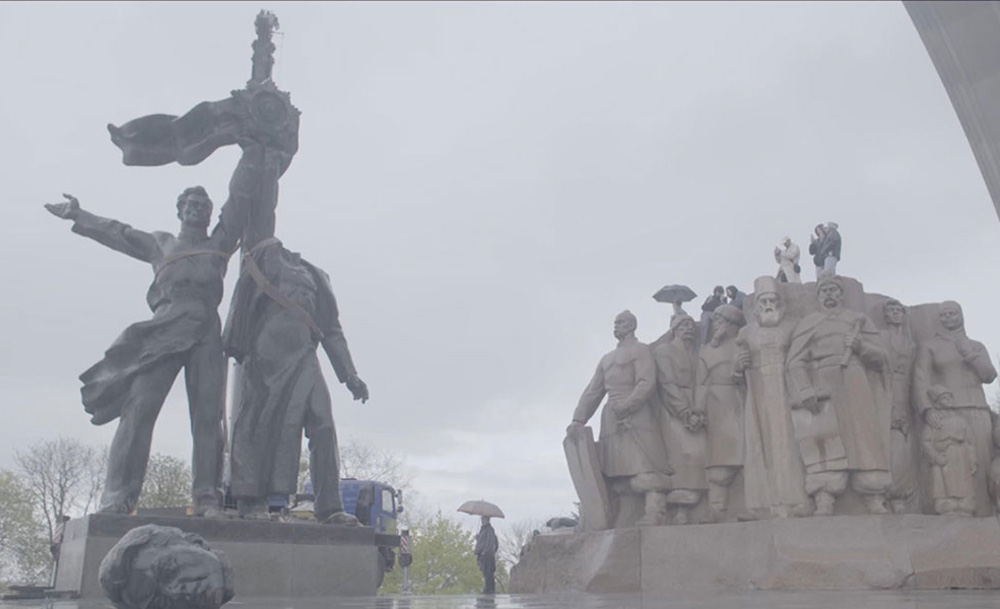It has become clear by now that Karim Amer has a great interest in logistics of social movements, having previously produced “The Square,” about the Arab Spring uprising, for Jehane Noujaim and co-directing “The Great Hack,” about the mobilized effort to reveal the propaganda campaigns of Cambridge Analytica, with her. For the ongoing invasion of Ukraine that has been primarily been reflected abroad in images of carnage, that interest in the nuts and bolts of how the country has staved off Russian aggression for as long as they have proves to be a welcome perspective on a situation that’s still very much unfolding and as the film itself goes to show, a war that’s being waged as much in public perception as on the battlefield.
There may still be a level of shock involved in the early moments of “Defiant,” not because Amer presents graphic imagery, but due to the blizzard of introductions to the members of Volodymyr Zelenskyy’s administration in the days immediately following February 23rd when Russia first breached the border. While the ubiquitous Ukrainian President is briefly caught on camera on one point making a hospital visit, the film is far more interested in turning its lens towards Iryna Vereschuk, the Deputy Prime Minister in his administration who set it up and has been traveling across the country to areas of conflict to make sure those in need of care or immediate assistance receive aid. She is joined — at least in a narrative sense when all of “Defiant”’s subjects are scattered around the world — by Dmytro Kuleba, the Minister of Foreign Affairs, who meets with foreign officials to curry favor for a potential bid to be in the EU and financial assistance; Rustem Umerov, a peace negotiator with the quixotic task of keeping channels of communication open with the Russians, and Mykhailo Federov, the minister of digital transformation who may have the most consequential job of all involved when large part of Ukraine’s success to date has stemmed from how organized their online operation has been.
“Defiant” really takes off when it reaches the nerve center where Alex Barnyakov, the director of digital transformation, thought he’d be setting up the biggest IT hub in Eastern Europe to bolster Ukraine’s position in the world before the invasion and instead has taken what was built to address more pressing concerns brought about by the war. It is impressive to see how the country harnessed its mobile network and encouraged the use of camera phones for a program called E-Enemy to actively create a chronicle of Russian aggression and use geolocation to pinpoint where Russian solders were at any given time to provide warning — and alarming to think of the same technology in the hands of bad actors. And while keeping the citizens of Ukraine informed is important, the film intriguingly shines a light on efforts to break through the disinformation campaign that has given Russians a false sense of the reason for the war and what’s actually taking place on the ground as civilian deaths in Kyiv are dismissed as staged by TV commentators parroting government officials and the public celebrates adoptions of Ukrainian children said to be orphaned yet were separated from their parents and handed over to Russian families.
This would be disturbing to audiences abroad even if it wasn’t inferred if global news networks weren’t being polluted by the same false narratives as Kuleba and Umerov appear on channels such as Fox News to disavow claims that have been made by Russian officials and “Defiant” transcends a consideration of this conflict to speak to what modern warfare will likely look like more generally. Still, there’s a bit of a double-edged sword in how “Defiant” feels like raw reportage, at once clearly communicating Ukraine’s ground game in such a way that cuts through the noise and at the same time having to end with the situation still very much in flux, culminating with the one-year anniversary of Kuleba’s initial speech to the U.N. General Assembly just as Russia fired their first shots. It’s been common of Amer’s films to be reedited after their festival premiere, in large part due to the urgency of the subjects he’s covered and their complexity, and it wouldn’t surprise me if “Defiant” was released in a slightly different form than the version I saw out of the Toronto Film Festival when the lack of a resolution prohibits the kind of convergence of storylines that has typically made Amer’s work so reverberant beyond its moment in history. Yet as a portrait of what’s happening right now, the film is vital and a true testament to information as power.
“Defiant” does not yet have U.S. distribution. It will next screen at the Woodstock Film Festival on September 29th and at the Warsaw Film Festival on October 6th.




